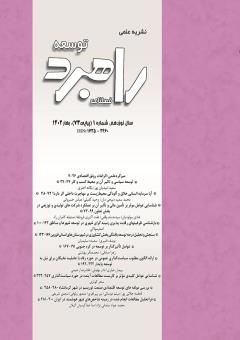عوامل تأثيرگذار بر توسعه در کره جنوبی
محورهای موضوعی :زهرا صادقی 1 , محمدباقر بهشتی 2
1 - دانشگاه تبریز
2 - دانشگاه تبریز
کلید واژه: کلمات کلیدی: کره¬جنوبی, توسعه, توزیع قدرت, دولت-ملت, كنفسيونيسم ,
چکیده مقاله :
پايان جنگ جهاني دوم آغاز دورهاي براي نوسازي و دستيابي به توسعه در كشورهاي مختلف بوده است و كشورهاي اروپايي و آسيايي بسياري به فراخور شرايطشان راهكارها و رويكردهاي مختلفي را براي اقدام به توسعه به كار گرفتهاند. کرهجنوبی یکی از این کشورهاست. کشوری که با تاریخی کهن یکی از یکپارچهترین و با ثباتترین کشورهای جهان به شمار میرود. توسعه این کشور که بعد از پایان جنگ جهانی دوم و استعمار ژاپن آغاز می¬شود، نمونه¬ای غیر معمول و سریع از توسعه در بازه¬ی زمانی بسیار کوتاه است. کره¬جنوبی کشور علی¬رغم از سر گذراندن تجربه¬ی تلخ مستعمره بودن، اتفاقاتی که پس از جنگ جهانی رخ داد و تقسیم شبه جزیره به دو بخش شمالی و جنوبی و جنگ داخلی¬ای که پیامد آن بود و همچنین فقر شدید و نیاز مبرم به کمک¬های بین¬المللی هم اکنون در کنار تايوان، سنگاپور و هنگ¬كنگ یکی از چهار ببر آسیا به شمار می¬رود. داشتن دولت¬های اقتدارگرا و در عین حال توسعه¬گرا، حس ناسیونالیسم قوی در برابر بیگانگان، فرهنگ كنفسيونيستی، تمرکز بر استراتژی توسعه صادرات، گسترش سیستم آموزشی همگام با نیازها و تحولات اقتصادی کشور از عوامل تأثيرگذاری هستند که در در راستای پرسش اصلی این مقاله به آنها پرداخته شده است. در انتها نیز مدل توسعه کره¬جنوبی ارائه می¬گردد.
Zahra Sadeghi Mohammadbagher Beheshti Abstract The end of Second World War has marked the beginning of an era of renovation and development for many countries in the world and European and Asian countries have utilized several development strategies based on their situation. South Korea is one of those countries. Having an ancient history, South Korea is one of the most integrated and stable countries in the world. Its development which starts right after the end of the second world war and Japanese colonization is an outstanding example of fast and extraordinary development in a short time span. Despite having the bitter experience of being colonized, what happened as a consequence of the second world war, the division of the peninsula into two parts (North and South) and the civil war following that, and the severe poverty and dependence on international aid, it is one of the Asian Tigers, together with Taiwan, Singapore, and Hong Kong. Having an authoritarian but developmentalist government, a strong sense of nationalism against foreigners, Confucian culture, a focus on export expansion strategies, and the development of an education system based on economic needs and changes are among the influential factors that are discussed in line with the main question of the paper. Finally, the development model of South Korea is presented.
